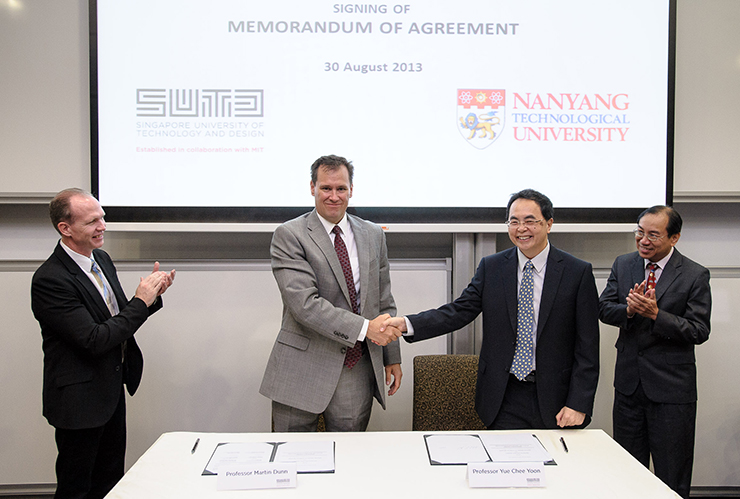Singapore’s 3D design and printing lab

SINGAPORE: Two local universities launched a joint lab on Friday to develop new techniques in 3D design and printing.
Nanyang Technological University (NTU) and Singapore University of Technology and Design (SUTD) will collaborate to research and develop innovative techniques in 3D design and printing.
Such new techniques will increase the range of products which can be made using 3D printing which usually produces an item by adding materials layer by layer.
To achieve this, the two universities today announced the launch of a joint lab in the field of Visualisation and Prototyping (VP). Named the VP Lab, the new multi-disciplinary research lab will have dual facilities located at NTU Yunnan campus and SUTD’s Dover campus.
In Visualisation, a product is designed using 3-Dimensional software, while in Prototyping, a 3D printer prints the product – also known as Rapid Prototyping or Additive Manufacturing.
As opposed to conventional manufacturing such as machining, casting and moulding, rapid prototyping will have less material wastage, takes less time to produce and yet, has lower production costs.
The VP Lab will have four research projects as a start, which leverages on the strengths of both universities, focusing on key areas such as large scale prototyping, multi-material additive manufacturing and embedded sensor technology.
The agreement was signed today by Professor Yue Chee Yoon, NTU’s Associate Provost for Graduate Education, and Professor Martin L. Dunn, SUTD’s Associate Provost for Research.
Professor Yue said that increasingly, 3D printing is becoming the preferred way by which industry creates new prototypes for their products.
“The advent in 3D design and printing allows anyone now to produce an item with complex configurations, while having the flexibility to accommodate design changes conveniently to meet rapid changing industrial demands without incurring additional tooling cost,” Prof Yue said.
“NTU has recognised strengths in relevant fields such as rapid prototyping, manufacturing technology and materials research. We are pleased to partner SUTD to create breakthroughs in this new field, as SUTD has expertise in optimising 3D visualisation and design that complements NTU’s strengths.”
Professor Martin Dunn, Associate Provost for Research at SUTD said, “The VP Lab brings together tremendous expertise from NTU and SUTD in 3D design and printing; the exciting research projects will positively impact Singapore, the region, and the world.”
“The effort is especially timely given the worldwide excitement in advanced manufacturing and the potential business-changing paradigms that new and emerging technologies are creating. The VP Lab is a strategic piece of our ambitious strategy and plans in digital manufacturing at SUTD, and we could not be more excited about its launch today,” added Prof Dunn.
Professor Kristin Wood, SUTD Head of Pillar for Engineering Product Development and co-Director for the SUTD-MIT International Design Centre (IDC), will be overseeing this collaboration together with Professor Chua Chee Kai, Chair of NTU’s School of Mechanical and Aerospace Engineering.
Prof Wood said, “Together with NTU, we aim to create a unique environment for innovating the next generation of methods, tools, techniques and technologies for designers and manufacturers.”
“The VP Lab will enable students, faculty and researchers to maximise the capabilities of digital manufacturing to develop technology for Singapore that was previously a mere dream or fantasy in our technical communities. I am certain, through this collaboration, that we will live up to the motto: ‘Undertake the Impossible. Design the Unexpected,” added Prof Wood.
Prof Chua said that in future, 3D design and printing will be a huge part of everyday life, with the possibility of printing many items, such as clothes, toys, crockery and even medical implants.
Prof Chua said, “This partnership builds upon NTU’s world-leading expertise in 3D printing, and I am confident it will lead top groundbreaking innovations, which is in line with our vision of keeping NTU and Singapore at the forefront of this emerging technology.”
The collaboration between the two universities is timely, due to the rapid growth of additive manufacturing related industry in Singapore recently, particularly in the aerospace, manufacturing, semiconductor and precision engineering industries.

The collaboration was announced on the same day as the official opening of the SUTD-MIT International Design Centre.
The 208 sq m centre at SUTD’s Dover campus is for faculty and students to do research and showcase their work. When the school moves to Changi in 2015, it will span 5,000 sq m over four floors.
Some 60 faculty members and 53 researchers from SUTD are involved in projects at the centre.
There are 78 ongoing projects, 16 of which are collaborations with the Massachusetts Institute of Technology (MIT), SUTD’s partner university in the US.
To carry out these projects, SUTD has obtained external funding of $12 million from industry partners and agencies.
One such project by SUTD Assistant Professor Chen Lujie is a software for prototyping, in which a scale model is produced to test a product concept.
Developing skilled manpower will also be a key priority at the joint lab, with NTU and SUTD contributing a total of $200,000 research funds and four PhD scholarships.
